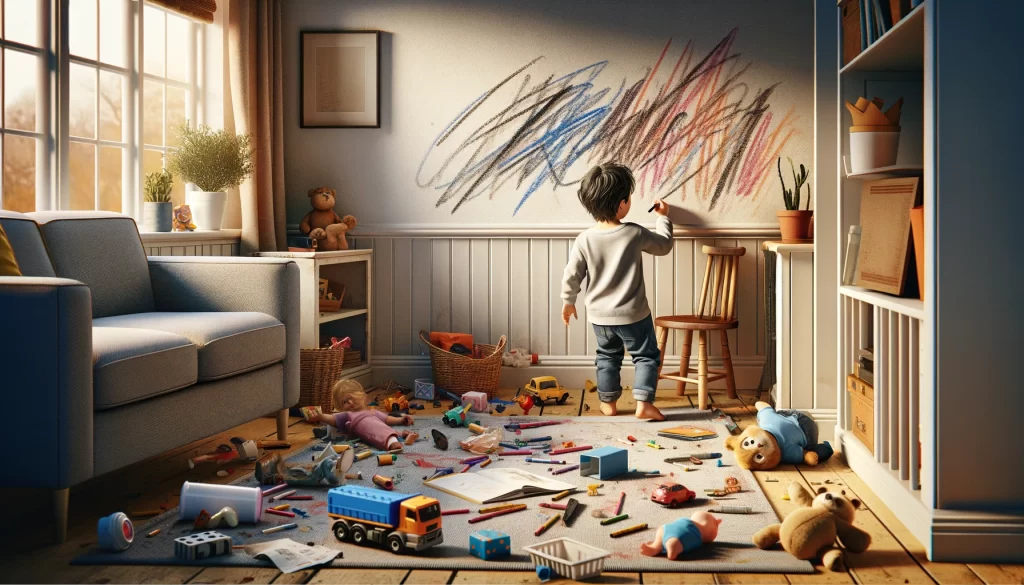
DALL-E
When it comes to children visiting someone else’s home, the line between innocent exploration and unacceptable behavior can sometimes blur. As parents, it’s our job to teach our kids the nuances of respect and etiquette in different environments.
Below are 13 of the most egregious faux pas children can commit while in another person’s home. These behaviors not only reflect on your parenting but also significantly impact your child’s social interactions and respect for others. From disregarding house rules to leaving a chaotic mess, let’s explore these critical missteps and how to steer your children towards more respectful conduct.
1. Climbing on Furniture and Jumping on Beds

DALL-E
One of the most apparent signs of disrespect in someone else’s home is when children climb on furniture or jump on beds. This behavior not only shows a lack of regard for the host’s property but also poses a risk of damaging items that aren’t theirs. Jumping on beds, in particular, can be harmful, as it can lead to broken bed frames or, worse, injuries.
To prevent such behavior, it’s important to have a conversation with your children about respecting the belongings of others. Discuss the potential consequences of such actions, not only in terms of damaging property but also in how it reflects on their manners. Encouraging them to play in designated areas and to use furniture appropriately can go a long way in fostering respect for other people’s spaces.
2. Being Rude to the Hosts

DALL-E
Rudeness, whether it’s talking back, ignoring adults, or general impoliteness, is one of the worst things a child can display in someone else’s home. It reflects poorly on them and you as a parent.
Teach your children basic manners, like saying “please” and “thank you,” and the importance of being respectful to adults. Role-playing different scenarios at home can be an effective way to instill these values.
3. Not Taking Care of Personal Belongings
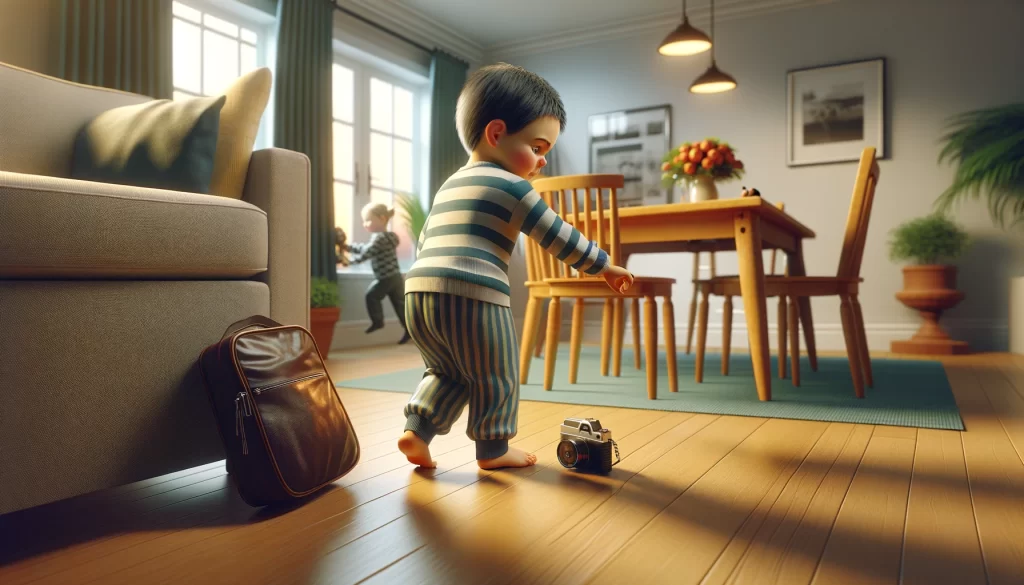
DALL-E
Leaving a trail of personal belongings around someone else’s home is not just messy, it’s inconsiderate. It shows a lack of respect for the host’s space and an absence of personal responsibility.
Encouraging your child to keep track of their things and be responsible for their own belongings is a crucial lesson in respect and self-care. This includes cleaning up after themselves and respecting the property of others.
4. Snooping Around
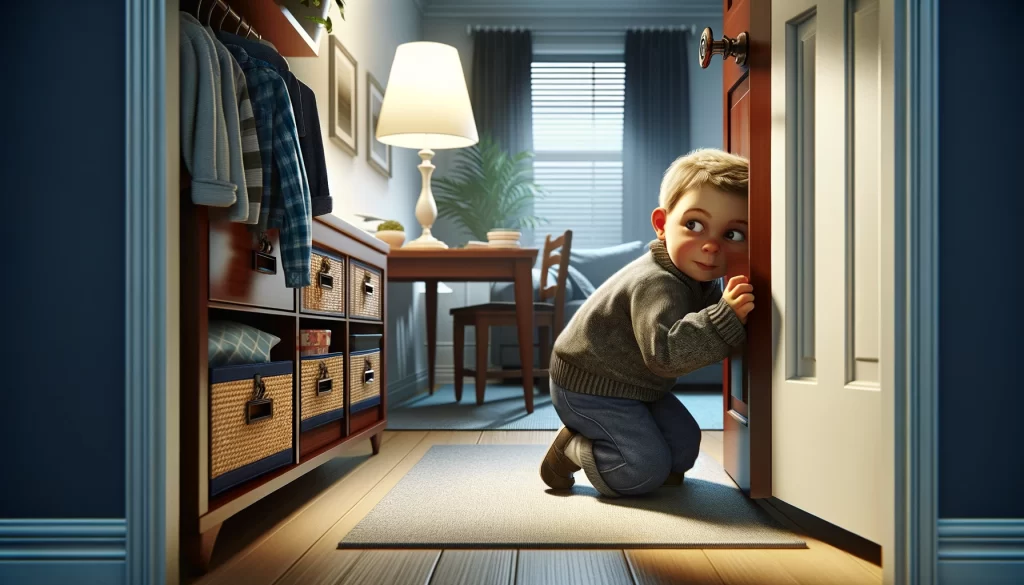
DALL-E
Curiosity can lead children to snoop around in someone’s house, but it’s a significant breach of privacy. It’s important for children to understand the concept of personal space and privacy early on.
Have a conversation with your children about boundaries and why it’s important to stay in designated areas unless invited otherwise. Reinforce respect for privacy as a fundamental value.
5. Constantly Bothering Adults with Requests for Snacks and Going Into the Refrigerator Without Permission

DALL-E
A major faux pas for children when visiting someone’s home is incessantly bothering adults with requests for snacks, or even more intrusive, going into the refrigerator without permission. This behavior can be disruptive and impose on the host, particularly if it interrupts conversations or activities. It also shows a lack of boundaries and understanding of personal space.
Teaching children to ask politely for things they need and to wait patiently for a response is crucial. Additionally, make it clear that entering someone’s refrigerator or cabinets without explicit permission is off-limits. It’s about respecting the host’s space and privacy. Encourage your kids to accept the snacks offered and to understand that they may not always receive what they ask for when they are guests in someone else’s home.
6. Being Too Loud or Boisterous
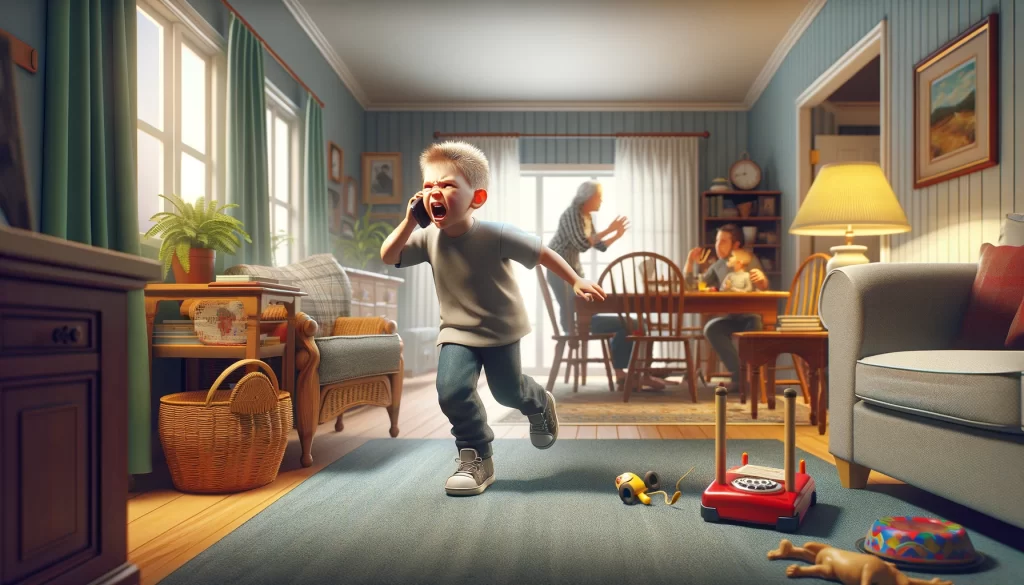
DALL-E
While kids are naturally energetic, being excessively loud or boisterous in someone else’s home can be disruptive and disrespectful. It’s important they understand the difference between indoor and outdoor behavior.
Talk to your children about the appropriate noise levels in different settings. Encourage them to be aware of their surroundings and adjust their behavior accordingly.
7. Refusing to Share or Cooperate with Other Kids
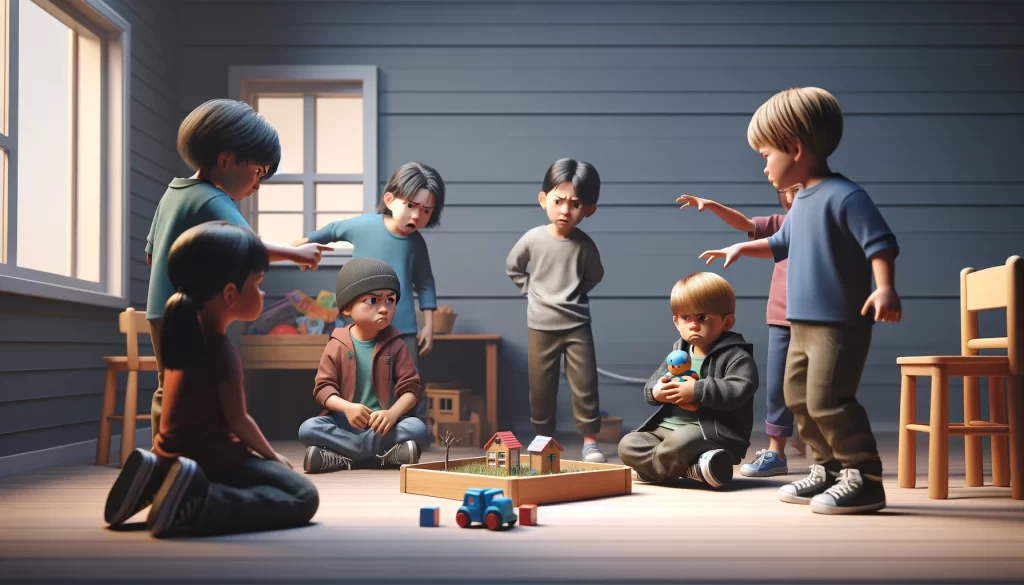
DALL-E
Refusing to share or play cooperatively with other children not only spoils the fun but can also lead to conflicts. It’s important for your child to learn to interact positively with their peers.
Encourage sharing and cooperation at home. Play games that involve taking turns and teach them the value of playing together harmoniously.
8. Making a Mess and Not Cleaning Up
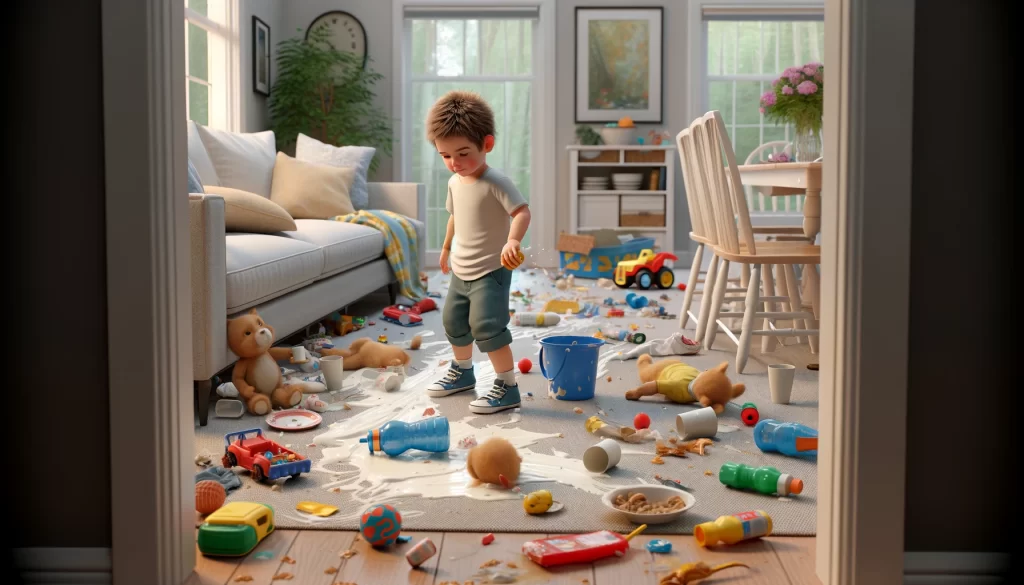
DALL-E
Making a mess is sometimes part of playing, but not cleaning up is a no-no. Teach your children to always clean up after themselves, respecting the space they are in.
Lead by example and involve your children in tidying up at home. Make it a fun, regular part of your routine, emphasizing the importance of leaving a place as clean as they found it.
9. Engaging in Dangerous or Destructive Behavior

DALL-E
Playing recklessly, which could potentially lead to breaking things or hurting themselves or others, is one of the worst things a child can do. Teaching your child to be mindful of their actions and their consequences is key.
Discuss safety and the importance of being aware of their surroundings. Encourage them to think before they act, especially in unfamiliar environments.
10. Being Ungrateful or Complaining

Designer
A child who is ungrateful or frequently complains can be unpleasant to host. Teach your children to appreciate the efforts others make for them and to express gratitude.
Encourage your kids to find something positive in every situation. Instill in them the value of being thankful for the experiences and opportunities they are given.
11. Excluding Other Children

DALL-E
Excluding others is hurtful and can lead to social isolation. It’s important to teach your child about inclusiveness and the impact of their actions on others’ feelings.
Talk to your child about empathy and the importance of making everyone feel included. Role-play situations where they include others in their activities.
12. Disobeying Direct Instructions or Requests

DALL-E
Disobeying direct instructions or requests from the host is a serious breach of etiquette. It shows a lack of respect and can put the child or others at risk.
Emphasize the importance of listening and following directions, especially when they are guests in someone’s home. This not only ensures their safety but also helps maintain a respectful environment.
13. Eating Disrespectfully
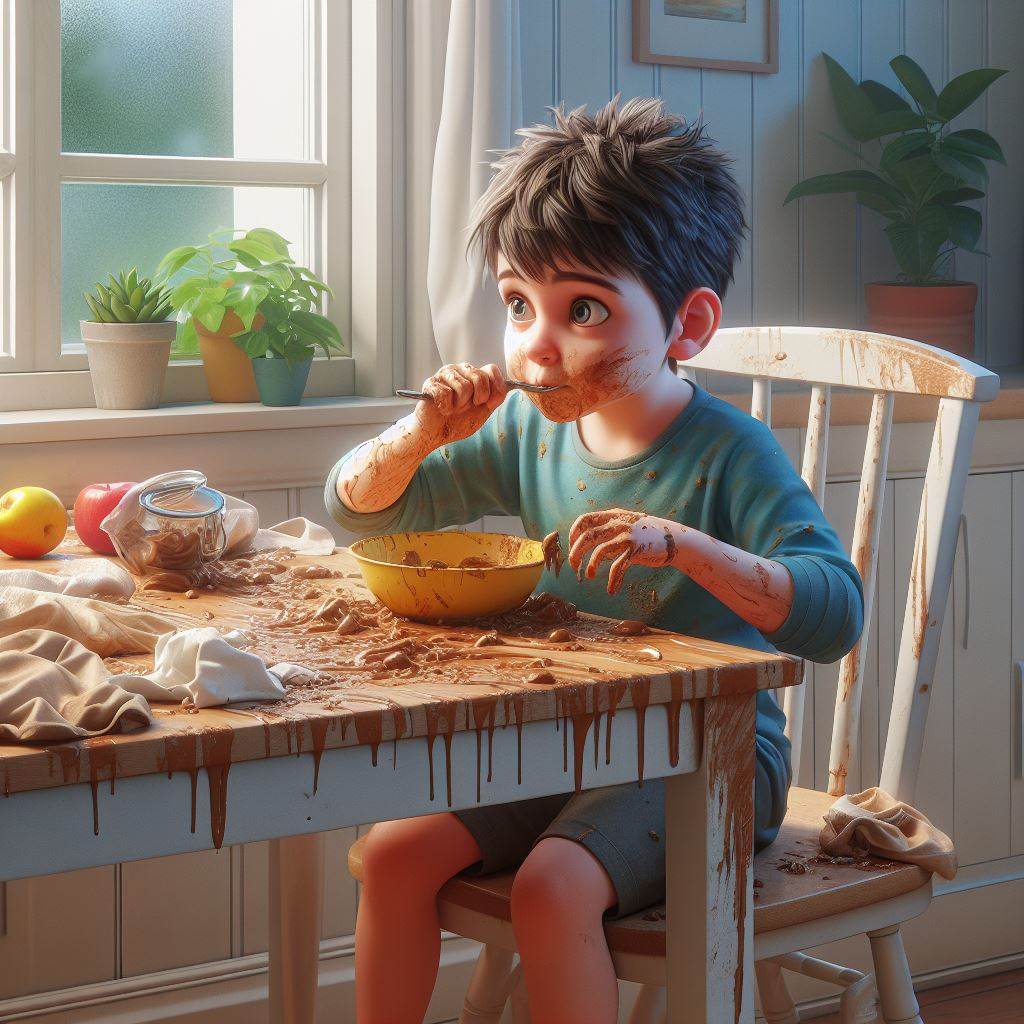
DALL-E
Whether it’s being overly picky, playing with food, or eating messily, disrespectful eating habits can be challenging for hosts. Teaching your child table manners and respect for the food provided is essential.
Model good eating habits and involve your children in setting and clearing the table at home. Discuss different food cultures and the importance of being open-minded and respectful when eating at someone else’s home.
Teach Them Respect and Good Manners

DALL-E
Guiding your children on how to behave in someone else’s home not only teaches them respect and good manners but also helps them develop into considerate and socially adept individuals. Encourage open communication about these topics and lead by example to instill these values in your children. For more parenting tips and advice, follow our content and join the conversation on raising well-mannered, respectful children.
Tamila McDonald is a U.S. Army veteran with 20 years of service, including five years as a military financial advisor. After retiring from the Army, she spent eight years as an AFCPE-certified personal financial advisor for wounded warriors and their families. Now she writes about personal finance and benefits programs for numerous financial websites.
Leave a Reply